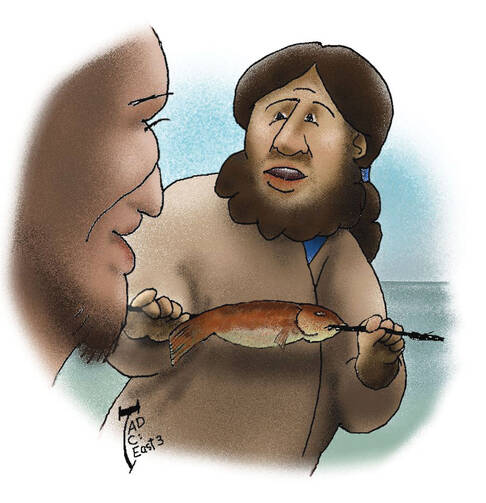Fish for Breakfast
It took the apostles some time to come to terms with the reality of Jesus raised from the dead; but once they accepted it, they had to face the challenges of day-to-day life in the context of their newly aroused faith. It was this tension between the mundane reality of ordinary life and the glorious reality of a Lord who now reigns with God that had to be resolved in the lives of the apostles. This tension was especially manifested in the apostles’ personal encounters with the risen Lord, who challenged them to transform themselves in imitation of him.
The Gospel of John presents a scene at the Sea of Tiberias, where a number of Jesus’ disciples had gathered. Jesus had already appeared to them twice, but Peter’s mind that day is on fishing. Whether that is on his mind because he needs to earn some money, to relax and pray for a while or just to catch some food to eat, Peter’s announcement is matter of fact: “I am going fishing.” Just as matter of fact is the response of the disciples, who say, “We will go with you.”
One can imagine the disciples on the boat and what they might be discussing together; or perhaps they are silent, trying to process the events of Easter and what their next tasks might be. The revelation of Easter puts them between two worlds. Their discipleship with Jesus has not come to an end, but how will they begin again?
They fish all night without a catch and Jesus appears to them a third time at dawn. While they do not recognize him initially, they cast their net to the right side of the boat when he instructs them to do so. Only when they struggle to pull in their miraculous catch of fish do they recognize Jesus. What Jesus does next is ordinary; he feeds them breakfast, cooking some of the fish over a charcoal fire and giving them bread. He cares for them in the most ordinary of ways, helping with their work and giving them food to eat.
But after breakfast Jesus gives to Peter an extraordinary task; as Jesus has fed his disciples, so Peter is now to feed his sheep. Jesus challenges Peter three times whether he loves him, and three times Peter answers yes, though he is “distressed that Jesus had said to him a third time, ‘Do you love me?’ and he said to him, ‘Lord, you know everything; you know that I love you.’ Jesus said to him, ‘Feed my sheep.’” Jesus has challenged Peter three times to profess his love in light of Peter’s threefold denial, but also to impress upon Peter his new vocation.
As simply as Peter said, “I am going fishing,” Jesus now instructs him, “Feed my sheep.” The Greek in this conversation is interesting, as Jesus asks Peter twice whether he loves him, using the verb agapao, love that pours itself out for others, and Peter responds with phileo, the word for deep love between friends. On the third occasion, however, it is not Peter who alters the verb, but Jesus. Jesus aligns himself with Peter, using phileo, not agapao, and Peter again responds with phileo, asserting that he loves Jesus deeply as a friend.
It is a subtle recognition by Jesus that the spiritual transformations necessary to follow him lie latent in our own gifts and abilities. Peter was called by Jesus to serve in a new way in order to feed his sheep, and his responses to Jesus indicated that he did not yet understand the full implication of this call even as he accepted it. Yet Jesus knew that these gifts lay dormant in Peter and he would be able to feed his sheep and follow him to death.
These gifts are made manifest soon after the ascension in Peter’s behavior in Jerusalem, when he is told to stop preaching in Jesus’ name and he responds, “We must obey God rather than any human authority.” Not only will Peter pour himself out for the name of Jesus, but he will do so filled with joy. Just as Jesus knew, Peter’s love for Jesus had grown so that now it fed not just his own needs but the needs of all of the disciples.
This article also appeared in print, under the headline “Fish for Breakfast,” in the April 8-15, 2013, issue.








